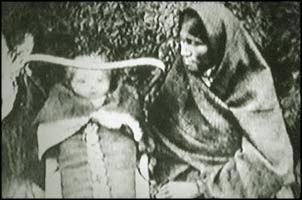Wahida C. Valiante
February is Black History month in Canada, an opportunity for children of many different faiths, colors, races, and cultures to learn how one race of people enslaved another because its people have skin of a different color. And because of this darker color, they were subjected to rape, physical and psychological abuse, deprivation of their basic rights, and loss of their humanity and self-identity. They were also forced into accepting an alien religion and culture that offered neither equality, freedom, nor liberty, to them or to their children.

Oppression justified by theories of essential superiority is an unacknowledged poison in the veins of our history and our society today.
During this month, Canadian children will also learn about the indomitable human spirit of an enslaved people who refused to surrender and went on to win hard-fought battles for their equality, freedom and liberty. Sadly however, those milestones have yet to materialize into a permanent victory for their descendents, who even to this day continue to suffer from the deep-seated malady of racial prejudice that festers in the soul of America. It is a malady fed by power, arrogance and greed, a malady that undermines human ideals and potential, spreading discord, destruction, and hate among countless people of different races, colors and nations.
America’s malady is also worsening in our own back yard, with the advent of ethnic and racial profiling of Arabs, Muslims, and blacks in Canada. In the case of Toronto Raptor, Dee Brown (reported in the Toronto Star, April 17, 2003) the court ruled that there is significant evidence it (racial profiling) exists. In the words of Brown’s defense lawyer, it is now clear, beyond dispute, that racial profiling is a reality in this province, in this city.
Recently, I was asked by several non-Muslims I met during a conference in Trinidad, why I think African Americans are embracing Islam in such large numbers. Instead of telling the famous story of Hajj by Malcolm X (Hajj is the annual pilgrimage to Makkah and is a prime example of the multi-racial aspect of Islam), I chose instead the story of a slave named Bilal.
Bilal’s story begins with the advent of Islam in Arabia. At that time, the most striking characteristic of Arabian society was its diversity of languages and religious practices, for unlike the Jewish tribes, pre-Islamic Arabs were not a distinctive entity or separate nationality. If anything, they were more like Christians, in being a community of believers comprised of diverse cultural, linguistic and ethnic streams from throughout the Arab world.
Even today, there persists a popular myth in the West that Islam is a “new” religion and that Muslims worship a “different” God, called Allah, not the God Yahweh or Jehovah of Jews and Christians. But the truth is that Muslims worship the same God and follow the same Prophets as Jews and Christians, their brothers and sisters “of the Book.” In fact, this is clearly stated in the Qur’an, where anyone of normal intelligence can read it. However, differences between the Qur’an and the Torah and Bible are evident in how the Qur’an views human equality and in how its teachings seek to eliminate inequalities that exist between races. Most notably, the Qur’an rejects the Jewish concept of racial superiority; that is, the status of their being a chosen people. This concept is not only racist, but directly contradicts the Qur’anic worldview of racial equality. Unfortunately, the Jewish idea of being “chosen” not only institutionalized racism, but also set a terrible precedent for human history in general, where racial superiority claims became the norm, the divisive standard by which all others, those not like us were to be judged and treated.

In his book Jewish History, Jewish Religion, the late Israel Shahak, an Israeli holocaust survivor, states that because of this psychology of racial superiority, Jews can never accept non-Jews (goyim), much less accept Palestinians as being their racial equals.
This belief in chosen people also formed the Protestant evangelical psyche that spawned Church-sanctioned colonial slavery and the virtual annihilation of First Nation peoples in the United States, and to a significant extent in Canada as well. There is little talk or acknowledgment in America, either of slavery and its sinister impact on the lives of countless men, women and children, or of the holocaust of disease and abuse that nearly wiped out the aboriginal peoples, and destroyed so much of their culture and sense of self. Both of these prolonged atrocities were carried out openly by the American government and its people, with the blessing of the Christian Church.
Today’s Christian fundamentalists, like their colonial predecessors, still suffer from the same racist malady as reflected in their view of Islam and Muslims. I was appalled to read that as America was unleashing its bombs on Iraqi civilians, Billy Graham’s son Franklin was also gearing up to attack Muslims with his brand of Christian indoctrination, camouflaged under the guise of humanitarian help in colorful “non-sectarian” shoeboxes full of goodies—including Christian tracts—distributed to Muslim children. The arrogance of these 21st-century evangelists is nothing less than dangerously destructive and divisive for world peace and security.
Who was Bilal? Bilal was a former Ethiopian slave, bought and freed by the Prophet Muhammad’s father in-law Abu Bakr. In Islamic history, Bilal is associated with a very important decision taken by the Prophet Muhammad( peace be upon him)concerning the issues of race and color. In a harsh, highly charged, and difficult social and political environment, Prophet took the brave and risky step of choosing Bilal, a freed black slave, to perform the Azan, the call of the faithful to prayers. His decision was based primarily on the Qur’anic teaching against racial discrimination, which explains the rationale behind Allah’s creation of humanity in different tribes, colors, religions, and races, so that you know each other (Li Ta’arafu).

Having been given the light of life, each of us has at least the duty to respect its universality, and its precious particularity.
Bilal possessed neither a prominent racial lineage nor power and wealth—only his profound faith and dying loyalty to its cause. The Prophet was well aware of Bilal’s upright character and honored him by choosing him to be the first Muezzin (the one whose voice calls the faithful to prayer) in the history of Islam. But some Muslims could not bear to accept Bilal as a rightful Muezzin because he was black- skinned, and when they heard him call—which was often—they even prayed that they could die, so as not to have to hear the Ethiopian’s voice (Azan) ever again. Yet against such discouraging odds, Bilal was to become one of the greatest people in the history of Islam.
Even today, in the most advanced societies where the cries for human rights are loudest, many are still prohibited, only by the “crime” of a different skin-color, from advancing to rightfully earned promotions, living in the homes of their choice, attending the schools and universities fitting to their abilities, and on top of these injustices, they are also targets of police abuse and racial profiling. Yet some 1400 years ago, Islam—born amid one of the most ignorant, tyrannical, tribal, and aristocratic regions of the known world—stood up to its obstinate adversaries and tirelessly fought against racial prejudice.
Thus Bilal’s name adorns the pages of Islamic history as a reminder to all those who incite discord and disunity among peoples, races and nations—but especially to Muslims—not to transgress the will of Allah in their behavior and thinking. Sadly, as we look around and reflect on the current religious practices and social conditions of so many Muslims in today’s world, we find them divided along artificial lines of nationality, ethnic identity, culture, nation state, rich and poor, elite and ignored, weak and powerful.
From this state of affairs, one can draw only the sad conclusion that Muslims have forgotten their illustrious history and the message of Bilal’s story as a reminder of Islam’s teaching of Li Ta’arafu. The Qur’an has emphasized that if we would aspire to be honored both in this world and the next, in place of racism, greed, and power, righteousness should be our foremost practice.
Wahida C. Valiante is national vice-chair of the Canadian Islamic Congress. She is a professional family counsellor, and can be contacted at nvp@canadianislamiccongress.ca
Article courtesy of Montreal Muslim News